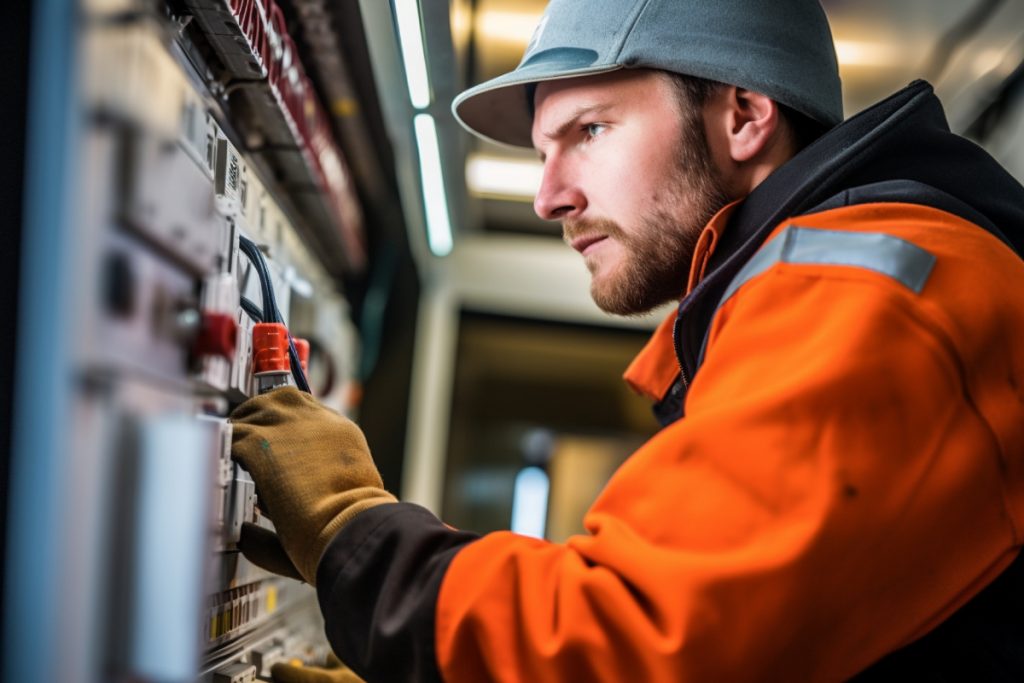A commercial electrician is a skilled professional who specialises in handling the installation, maintenance, and repair of electrical systems in commercial entities. These can include businesses, offices, retail locations, restaurants, and any other non-residential building.
Commercial electricians are trained to understand the complexities of commercial electrical systems, ensuring they can manage these systems efficiently and safely.
In this blog post, we will delve deeper into the role of a commercial electrician, detailing their key duties, the required qualifications, and the differences between commercial and other types of electricians. We’ll also illuminate why their role is essential in maintaining a safe and efficient commercial environment.
Need a Professional Electrician in Luton? Call Us on 01582797325 to book one.
The Key Duties of a Commercial Electrician
The responsibilities of a commercial electrician are diverse, primarily revolving around the electrical needs of commercial establishments. These can include, but are not limited to:
- Installation: Commercial electricians handle the electrical installation during the construction or remodelling of commercial buildings. This can involve the installation of electrical systems, lighting, security systems, and other electrical fixtures.
- Maintenance and Repair: Routine checks and maintenance of electrical systems fall under the responsibility of a commercial electrician. They also troubleshoot issues and carry out repairs as necessary to minimise disruption to the business operations.
- Safety Inspections: One of the vital roles of a commercial electrician is to conduct regular safety inspections to ensure that all electrical installations and appliances meet safety standards.
- Blueprint Reading: Commercial electricians read and understand blueprints to ensure electrical systems are installed correctly during the construction of a new commercial building.
Required Qualifications and Skills
Being a commercial electrician requires a particular set of qualifications and skills, some of which include:
- Technical Knowledge: This includes a deep understanding of electrical systems and proficiency in interpreting and working from blueprints and technical drawings.
- Training and Certification: A commercial electrician should have completed a Level 3 NVQ Diploma in Electro-Technical Systems and Equipment. These electricians can also be certified by recognised bodies, such as the National Inspection Council for Electrical Installation Contracting (NICEIC) or the National Association of Professional Inspectors and Testers (NAPIT).
- Problem-Solving Skills: Commercial electricians must diagnose and solve complex electrical issues, which requires excellent problem-solving abilities.
- Physical Fitness: The job often involves physical tasks, like climbing ladders or lifting heavy equipment, so a good level of physical fitness is typically necessary.
- Communication Skills: Good communication skills are also essential, as commercial electricians often work with a team and interact with clients.
The Differences Between Commercial and Domestic Electricians
While the fundamental skills and knowledge of all electricians are similar, there are key differences based on the type of work environment. These differences include:
- Electrical Systems: Commercial buildings typically have more complex electrical systems than residential properties, including three-phase power systems. Commercial electricians are trained to work with these systems.
- Wiring Regulations and Standards: The electrical wiring regulations are the same, but some standards for commercial buildings can differ from those for residential properties. Commercial electricians need to stay updated on these regulations to ensure all work is compliant.
- Equipment: Commercial electricians work with specific equipment that may not be found in residential settings, such as larger cable trays, tracking systems or conduit benders.
- Working Hours: Commercial electricians may have to work outside of regular business hours to minimise disruption to commercial operations.
The Importance of a Commercial Electrician
The role of a commercial electrician is crucial in maintaining a safe and efficient commercial environment. Their in-depth knowledge of commercial electrical systems and regulatory standards ensures that all electrical work is performed correctly, safely, and to BS 7671 Wiring Regulations.
By handling everything from installations to maintenance and inspections, commercial electricians help commercial establishments operate smoothly, avoiding potential electrical issues that could interrupt business operations or even pose safety risks.
Conclusion
In conclusion, a commercial electrician is an invaluable asset to any commercial establishment. Their expertise ensures the safety, functionality, and efficiency of all electrical systems within a commercial setting.
Their role is not only essential to the daily operations of businesses but also to the overall safety of employees and customers.
So, the next time you see the light flickering at your office or encounter an electrical issue at your place of business, remember the importance of these skilled professionals and consider reaching out to a certified commercial electrician.
They are the unseen heroes who keep our commercial establishments running smoothly and safely, day in and day out.
Need a Professional Electrician in Luton? Call Us on 01582797325 to book one.
Related posts:










